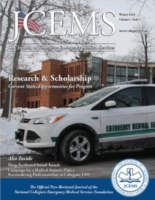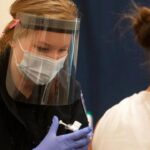 The Journal of Collegiate Emergency Medical Services (JCEMS) [ISSN: 2576-3687 (Print), 2567-3695 (Online)] is the official, peer-reviewed journal of the National Collegiate Emergency Medical Services Foundation. Established in 2017, JCEMS publishes the only scholarly journal and news source dedicated exclusively to the collegiate and campus-based EMS community. JCEMS publishes three print issues per year and provides exclusive content online on its open-access website (CollegeEMS.com). Subscribe to JCEMS Publication Alerts or request a print subscription quote to receive premier access to research, news, and scholarship.
The Journal of Collegiate Emergency Medical Services (JCEMS) [ISSN: 2576-3687 (Print), 2567-3695 (Online)] is the official, peer-reviewed journal of the National Collegiate Emergency Medical Services Foundation. Established in 2017, JCEMS publishes the only scholarly journal and news source dedicated exclusively to the collegiate and campus-based EMS community. JCEMS publishes three print issues per year and provides exclusive content online on its open-access website (CollegeEMS.com). Subscribe to JCEMS Publication Alerts or request a print subscription quote to receive premier access to research, news, and scholarship.
Subscribe to JCEMS Publication Alerts
Be the first to be notified of the latest collegiate EMS research, news, and scholarship. Receive alerts when JCEMS publishes content, all available on our open access site:
Single Issue Reprints & Subscription Options
Support the JCEMS mission to promote leadership, clinical excellence, and original research. Request a quote for single issue reprints or annual subscriptions (institutional or personal). A sales representative will contact you shortly with the requested quote.





